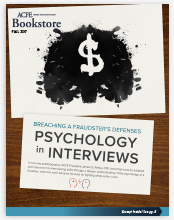The Relativity of Ethics
/Where do you draw your ethical line? Would you take a coworker’s apple from the community fridge? Would you snag a couple of pens from your employer? Would you pay the parking meter if there’s only ten minutes left on the clock? Would you embezzle $10,000 from a company worth $50 million?
In the most recent episode of Fraud Talk, John Gill, J.D., CFE, ACFE Vice President-Education, sits down with Art Markman, Ph.D., a professor of psychology and marketing at the University of Texas, to discuss how and where we all draw our ethical lines.
Below is an excerpt from the full transcript of the discussion, which you can download in PDF form or listen to at the bottom of this post.
John Gill: Welcome to this edition of Fraud Talk. I'm John Gill, vice president of education for the ACFE, and today my guest is Art Markman. He is a professor at the University of Texas at Austin in psychology and marketing. He's also the founding director of the Human Dimensions of Organizations Program at UT. He has a lot of degrees. He's got a B.S. degree from Brown and Ph.D. from the University of Illinois. He's taught at Northwestern and Columbia. I know from talking to him previously, the University of Texas is proud to have him as an instructor because he's a good one.
The reason I found out about Art, I had seen a couple of different articles that he had written on employee fraud and just bad behavior in general. That's one of my favorite subjects to talk about. We met a few weeks ago and just had a great discussion, so I invited him to come down to the headquarters here in beautiful downtown Austin and talk about fraud and bad behavior.
So, Art, welcome.
Art Markman: John. Thanks. It's great to be here.
John: You were in a lot of articles. One I enjoyed was called “The Psychology Behind Why People Steal Their Coworkers Stuff.” I know at the ACFE sometimes we focus on the big frauds and people…CEOs, CFOs stealing millions of dollars. I enjoyed this because it really went down to a more basic level about. Why does a seemingly honest, hard-working, gets-along-with-their-coworkers [employee], steal somebody's lunch out of the refrigerator?
Art: It's so funny, too, because I think actually, even when you look at the big stuff, there are evil people in the world, but most of the time, you're dealing with people who I think have a self-image of being a perfectly upstanding citizen who may go down a particular slippery slope or convince themselves that they can do something. I think there are some parallels actually, between what you see in the really big cases and what you see just in the run-of-the-mill, somebody grabbing something that isn't theirs out of the community fridge. Part of it, there are several different intersecting factors, one of which is just the availability.
One of the things we know about cheating behavior, in general, is that if you give people an easy opportunity to cheat at something, they will do it when there's very little chance that they're likely to get caught doing it, and where they think the consequences are fairly low. Whether it's snagging a snack or a sandwich out of the refrigerator, or just think of something really mundane. It's 10 minutes to six o'clock. You park in a parking spot that requires you to pay for it. You look around and you think there's very little likelihood that someone's going to come by and write you a ticket in the next 10 minutes. So, you know, “I'm just going to park.”
Well, technically speaking, you have done something that is in violation of the ordinance that governs parking in that area. Yet, I think most people would think it was a calculated risk, and they wouldn't really be casting it even in moral terms. I don't think for a moment someone would think of that as having an impact on their goodness as a human being. I think that when we think of things that are relatively victimless kinds of crimes, we can uphold our self-image that way. I think if you don't picture the face of the person whose lunch you just took, you don't even necessarily think about how this is affecting someone else.
It's easy to do. There's a very low likelihood anyone's going to catch you. There's nobody watching. It doesn't feel like you're doing anybody any significant harm. All of these factors come together in a perfect storm that supports this kind of low-level bad behavior.
John: Well, I can see that. There might be an apple that's been in there — and I've had this before — it's like, “This apple's been in here for three days, and it's going to go bad if somebody doesn't eat it.”
Art: Fair game, now.
John: You start thinking, you're doing the apple a favor. “Well, if they don't want it and I'm hungry, why can't I just go ahead and take that apple?”
Art: Right. It just doesn't feel like a problem. Of course, the amount of effort that might be required to act ethically in that situation, putting a sign out saying, “Is this anybody's apple? Would somebody mind if I took it?” It feels like a tremendous amount of energy to go through for something that doesn't seem that important. It's interesting because, on the one hand, it's easy to see how people can slide into doing that. Again, people draw their ethical lines in different places. I don't think I'm the sort of person who would take lunch, but I've probably got a couple of pens at home that once belonged to an institution that I work for. I think that there are certainly places where people may slip across a line without necessarily thinking too deeply about it.



